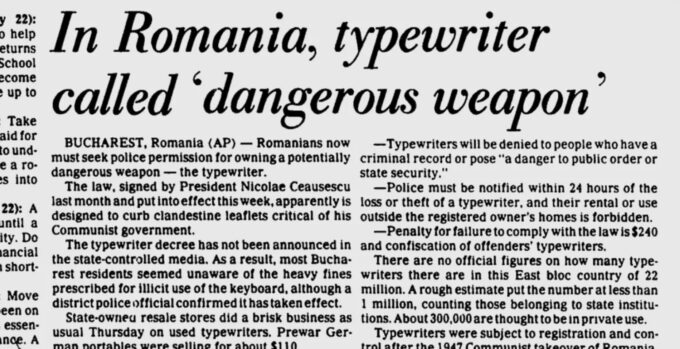This was originally published on Pessimists Archive.

Imagine a world where you must seek permission from the government to own a potentially dangerous weapon – not a firearm, not an explosive, but a tool for writing. As bizarre as it sounds, this was the reality in Romania under President Nicolae Ceausescu’s regime when the typewriter was classified as such a threat.
Typewriters were heavily regulated in the USSR, rolled out in Romania after the 1947 Communist takeover. The measure was lifted in the early 1960s, but brought back under Ceausescu. In 1983, Ceausescu’s government enforced a law requiring typewriter owners obtain a license from the police to own or even retain these ‘dangerous’ devices.
The apparent reason was to curb clandestine leaflets critical of the Communist government. This wave of regulation stemmed from a fear of information dissemination, an inherent dread of thoughts and ideas spreading freely, that could potentially destabilize the regime.
The rules were as follows:
- Typewriter owners must submit written applications to police for permission to keep or buy a machine, then wait for an answer.
- If the application is approved, the owner must submit a type sample of numbers and letters for registration with authorities.
- If the license is withdrawn, owners must sell their machines within 10 days to a state-run shop. Private sale is forbidden, but the owner is allowed one appeal.
- Typewriters will be denied to people who have a criminal record or pose “a danger to public order or state security.”
- Police must be notified within 24 hours of the loss or theft of a typewriter, and their rental or use outside the registered owner’s homes is forbidden.
- Penalty for failure to comply with the law is $240 and confiscation of offenders’ typewriters.
As we continue to debate the role of LLMs in society, it would be wise to consider this historical context. While it’s necessary to figure out how to mitigate potential misuse, it’s also crucial to recognize and harness the potential benefits these technologies can bring. China has already banned ChatGPT, while lawmakers in the US and EU consider the prospect of requiring licenses to use large language models.
